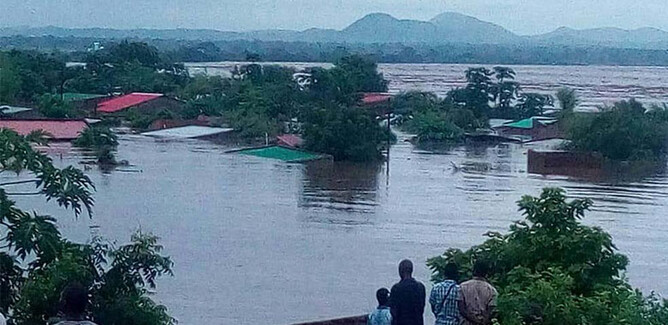We have just received the following update from one of our sister organisations, Bright Hope World, about the scale of the disaster in Mozambique. The report, written by Patrick, a local Pastor, highlights just how great the need is.
Rescue workers in Mozambique are racing against time to save hundreds of people clinging onto roofs and trees around the devastated city of Beira. These efforts come days after a powerful cyclone triggered flash floods, submerging entire villages and wiping out communities across southeastern Africa.
Aid workers on Wednesday spoke of women trapped in trees “throwing their babies” onto rescue boats. They talked of plucking people from head-deep water, only to strand them in patches of land where the water reached their ankles. Cyclone Idai hit Beira with winds of up to 170 kilometres per hour last Thursday, then moved inland to Zimbabwe and Malawi, killing hundreds and putting the lives of millions at risk. United Nations officials say this could be the worst ever weather-related disaster to have struck the southern hemisphere. Authorities say at least 200 people have died in Mozambique and 98 in Zimbabwe, but the death toll is likely to rise as rescuers continue to find bodies. Mozambican President Filipe Nyusi, who has declared a national emergency and three days of mourning starting on Wednesday, has warned that the eventual number of those killed in the cyclone and flooding could rise to more than 1,000.
According to earlier estimates by the International Federation of Red Cross and Red Crescent Societies, 90% of Beira and its surrounding areas appear to be completely destroyed. Josias Elias, found clinging to a tree almost submerged in water, said his entire village near Beira was flooded. There’s no more reason to go back. All of the houses have been destroyed.
On Tuesday, rescuers saved 167 people around Beira with the help of South African Air Force helicopters. On Wednesday, rain was continuing to fall in and around the city of some 500,000 people, complicating rescue efforts and meaning that aid had to be flown in by helicopter or plane. The devastation is vast. As far as the eye can see, it’s just water, you can’t see any land, the women were throwing their babies from the trees into our paddle boats.
The scale of the disaster unleashed on Mozambique by Cyclone Idai remains unknown. But the testimony by Mr Taylor, a stranded motorist who survived, hints at the magnitude of the tragedy unfolding in one of the world’s poorest countries. Caught in the floods unleashed by Idai after it made landfall near the port of Beira last week, Mr Talyor, a former Zimbabwean farmer living in Mozambique, abandoned his car on Monday and walked 15 miles along a raised road to safety in the village of Nhamatanda. His six-hour walk revealed a scene of “carnage and death.”
“People were on the rooftops and in the eucalyptus, mango and cashew nut trees,” he said. On dryer land, hundreds of survivors searched in the dark for missing members of their families. By the light of his mobile phone, he counted bodies as he walked, estimating he saw up to 400 floating in the water or washed up by the current onto the road, where survivors and relatives stood over the corpses, weeping in grief. He speculated the government’s early estimate of 1,000 dead would prove to be woefully short. “I’m guessing, but it is well into the thousands – four, five, six thousand”
The level of chaos in the affected areas is unimaginable, the safety campsites which have been made are overcrowded with hungry people. These sites are understaffed and don’t have enough food for everyone. The provisions that arrive are fought for by individuals.
Most of the areas are covered in water and the only way to access these remote areas is by helicopter. We as the leaders have decided to send someone to the north for an assessment on how best we can operate. It would not be wise to go on a mission without knowing how bad things are and if we would be able to assist to the best of our ability. After the assessment has been done and the people have been allocated to designated areas, that’s when a team from Maputo will go with supplies for the believers in the north.
We desperately need the water to subside as we don’t have the means of reaching some areas where the believers are. Please pray that the water levels decrease. There are talks of releasing water from the dams close by for fear of them bursting, this could worsen an already dire situation. Join us in prayer for the believers and locals who have been affected by this disaster.
Yours in Christ,
Patrick

